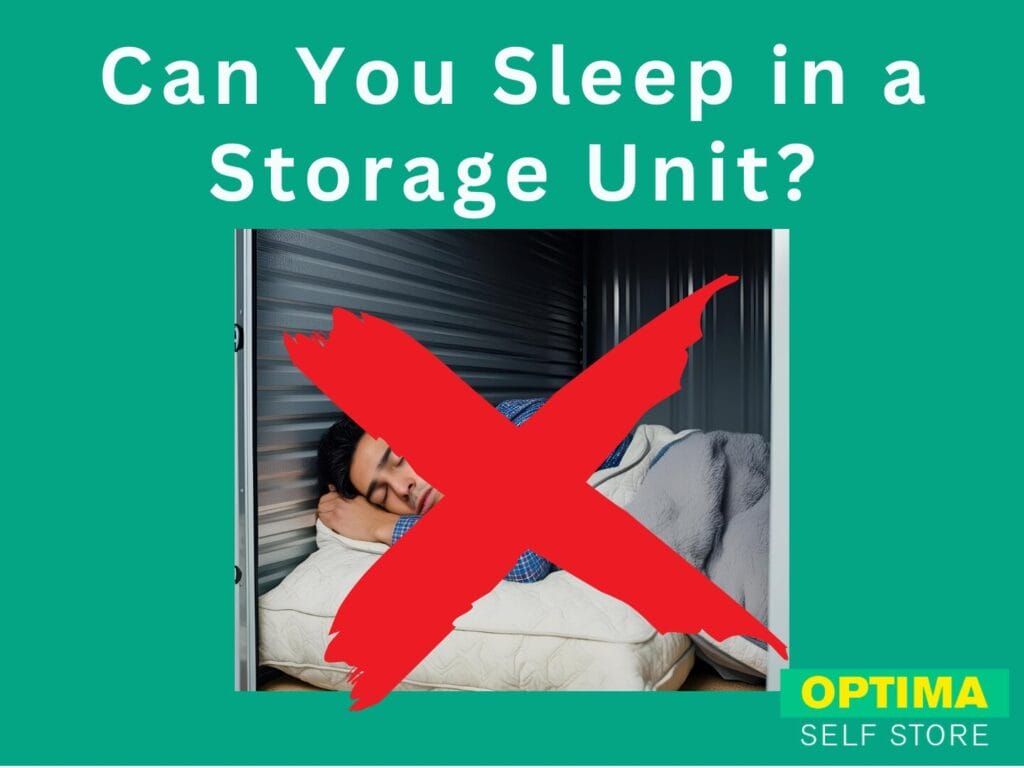Can you sleep in a storage unit?

Can You Sleep in a Storage Unit? Here’s What the Law Says
With the cost of living climbing and housing pressures increasing across the UK, it’s understandable why someone might consider sleeping in a storage unit. At first glance, it might seem like a private, low-cost solution, but it’s not safe, and more importantly, it’s illegal.
In this article, we explain exactly why storage units are not suitable for sleeping, the legal consequences of doing so, and the safer alternatives available if you’re facing housing difficulties.
Key Takeaways:
- It is illegal to sleep in a self storage unit under UK law, and doing so can result in eviction, fines, or even criminal charges.
- Storage units are not safe for human habitation because they lack ventilation, sanitation, fire protection, and temperature control.
- Sleeping in a unit poses serious health risks, including suffocation, extreme cold or heat, and entrapment.
- While people may consider it during tough times, the risks far outweigh any perceived benefit.
- Safer alternatives are available, such as emergency shelters, council housing assistance, and support from charities like Shelter or Crisis.
- Storage companies enforce strict rules and use surveillance and access controls to prevent units from being misused.
Is It Legal to Sleep in a Storage Unit in the UK?
No, it is illegal to sleep in a self-storage unit under UK law and the terms set out in standard rental agreements. Storage units are not classified as habitable spaces under the Fitness for Human Habitation Act 2018 and related legislation.
Self-storage facilities clearly prohibit any form of residence or overnight stay. This is reinforced in every contract because of the serious safety, legal, and insurance implications involved.
Why It’s Illegal and Dangerous
Health and safety hazards: Storage units lack proper ventilation, insulation, power, water, or sanitation. This creates serious risks like suffocation, heatstroke, hypothermia, and poor hygiene.
Zoning regulations
Storage facilities are designated for commercial use only, not residential purposes.
Insurance exclusions
If you stay in a unit overnight and something goes wrong, you’re not covered. That includes fire, injury, or property damage.
Security issues
An unauthorised overnight presence can put staff, other tenants, and property at risk. Storage companies take this very seriously.

What Happens if You’re Caught Sleeping in a Storage Unit?
Getting caught sleeping in a storage unit can lead to serious consequences. Firstly, your contract will likely be terminated immediately, and you’ll be evicted from the premises. In some cases, fines or penalties may follow for violating fire and health codes. Depending on the situation, criminal charges may also apply, especially if you’ve tampered with the unit or caused damage.
The Health Risks You Might Not Think About
Extreme temperatures
Without heating or cooling, storage containers can become dangerously hot or cold.
No ventilation
Poor airflow increases the risk of mould, mildew, and even carbon monoxide poisoning.
No fire protection
Units don’t contain their own fire alarms or sprinklers. Using devices like portable heaters or power banks inside is a serious hazard.
No water or toilet access
Lack of sanitation is not only uncomfortable; it can quickly become a health issue.
Risk of entrapment
Many units lock from the outside. If the door closes while you’re inside, you may be unable to get out.
Why Do People Try Sleeping in a Storage Unit?
People often consider sleeping in a storage container because they are dealing with homelessness, financial hardship, or housing instability. Some see it as a temporary fix that offers privacy and security. But these perceived benefits are outweighed by the harsh reality: storage units are not designed for people. They are not safe, legal, or suitable for living under any circumstances.

Safer and Legal Alternatives
If you’re facing housing difficulties, there are much safer and legal ways to get help than trying to live in a storage unit. These options may offer you access to proper facilities, support services, and a secure place to stay.
Emergency shelters
Usually run by local councils or charities, these shelters can provide a roof over your head, somewhere safe to sleep, and access to food, hygiene facilities, and support workers.
Housing charities
Organisations like Shelter and Crisis offer guidance on housing rights, benefits, and available accommodation. They also assist with legal advice, advocacy, and applications for emergency housing.
Council housing support
Your local council has a duty to help if you’re at risk of homelessness. They may be able to place you in temporary accommodation while helping you find something longer term.
Short-term lets or hostels
In some cases, short-stay rooms or shared hostels are available, offering a legal and safe alternative to rough sleeping or unsafe arrangements.
Government support
You may be eligible for financial assistance such as Universal Credit or Housing Benefit, which can help you afford a room in shared housing or cover part of your rent.
How Storage Facilities Enforce the Rules
Storage companies take the misuse of their units seriously and have several measures in place to prevent people from attempting to live in them. Most facilities have 24/7 CCTV monitoring across their sites, as well as PIN-controlled or keycard-only access to keep a record of who enters and exits. Some also have on-site staff or carry out regular walkarounds to spot any unusual activity.
Most importantly, every customer signs a rental agreement that clearly outlines that units are to be used for storage purposes only, living or sleeping in a unit is strictly prohibited. If misuse is suspected, the facility will intervene quickly, which could include immediate eviction and cancellation of the rental contract.
Final Word: Storage Units Are Not for Living In
Living in a storage unit might seem like a workaround during tough times, but it’s neither legal nor safe. These spaces are built for belongings, not people.
If you’re facing housing problems, there is help out there. From local councils to national charities, you can get support without putting your health or future at risk.
And if you simply need a place to store your things? Reputable storage companies are here to help, with secure, affordable, and legal options designed to keep your items safe, not you.


